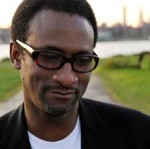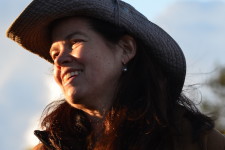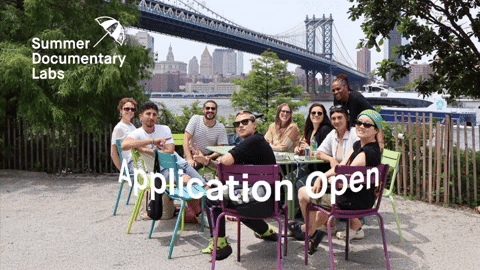Yates is an American filmmaker and human rights defender and was born and raised in the Appalachian coal mining region of Pennsylvania, but left home at an early age to live in New York City.

- This event has passed.
Nov 10, 2016 at 7:30 pm
NYC Filmmakers Gathering: Next Steps Now!
With Jon Alpert, Matt O'Neil, Melvin Estrella, Pamela Yates, & Yvette Alberdingk Thijm.
In light of the election results and to transform our panic and fear into resolve and action, we invite filmmakers and documentary producers to gather. Now more than ever we need to come together to organize, connect, and brainstorm the steps forward for media-makers seeking a different vision for the future. The price of admission is an idea committed to paper.
Skylight Pictures, DCTV, WITNESS, Brooklyn Filmmakers Collective, and UnionDocs, (and closed to other orgs and independents… hit us up) will gather to share specific and short examples of past projects, ideas, and frameworks that might offer inspiration in this dark and confusing moment. These will be reminders of how the work we do can make an impact and a critical conversation about where we’ve missed the mark. We expect a highly participatory event, an closed mic of ideas, to strengthen us and start a new process.
Organized as a part of the BK@24FPS human rights documentary series, this evening will be closed to participation from all and will incorporate voices from all over the NYC documentary community including Jon Alpert (DCTV), Matt O’Neil (DCTV), Pamela Yates (Skylight Pictures), Yvette Alberdingkthijm, (WITNESS), Melvin Estrella (Independent, The Moth), UnionDocs and more. Come ready to share, talk, decompress, process, and activate ideas for the future.
Matt O’Neil
 Matthew O’Neil is an Emmy® Award winning and Academy Award ® nominated director whose been working with DCTV making documentaries for the last ten years. For the 2006 HBO documentary he directed with Jon Alpert, Baghdad ER, he earned a Columbia DuPont Award, a Peabody Award, an Overseas Press Club Award and three Primetime Emmy Awards for Nonfiction Programs (Best Directing, Best Cinematography and Exceptional Merit in Non-Fiction Programming). His other HBO documentaries include the Academy Award ® nominated Redemption (2013), the Emmy® nominated Alive Day Memories: Home From Iraq, the Emmy® nominated Section 60: Arlington National Cemetery (2008), the Academy Award ® nominated China’s Unnatural Disaster: The Tears of Sichuan Province (2009), the Academy Award short-listed In Tahrir Square: 18 Days of Egypt’s Unfinished Revolution (2012) and Wartorn: 1861-2010 (2010) – winner of the 2011 Robert F. Kennedy Journalism Award Grand Prize. His other documentaries have aired on PBS, ESPN, Channel 4, NHK and broadcasters worldwide. In 2005 he was awarded a Pew Fellowship for International Reporting and his filmmaking overseas since has taken him from the steppes of Siberia to the scrap mines of Potosi in Bolivia and on to Russia, Turkey, China, Cuba, Iraq, Indonesia, Kazakhstan, Kuwait, Bolivia, Mexico, Haiti, Afghanistan, Egypt, Venezuela and North and South Korea. His work closer to home has been recognized with five New York Emmy Awards and a Sigma Delta Chi Award for Public Service Television Journalism. Matthew grew up on Long Island in New York, graduated from Yale University with a degree in Theater and is a Term Member of the Council on Foreign Relations.
Matthew O’Neil is an Emmy® Award winning and Academy Award ® nominated director whose been working with DCTV making documentaries for the last ten years. For the 2006 HBO documentary he directed with Jon Alpert, Baghdad ER, he earned a Columbia DuPont Award, a Peabody Award, an Overseas Press Club Award and three Primetime Emmy Awards for Nonfiction Programs (Best Directing, Best Cinematography and Exceptional Merit in Non-Fiction Programming). His other HBO documentaries include the Academy Award ® nominated Redemption (2013), the Emmy® nominated Alive Day Memories: Home From Iraq, the Emmy® nominated Section 60: Arlington National Cemetery (2008), the Academy Award ® nominated China’s Unnatural Disaster: The Tears of Sichuan Province (2009), the Academy Award short-listed In Tahrir Square: 18 Days of Egypt’s Unfinished Revolution (2012) and Wartorn: 1861-2010 (2010) – winner of the 2011 Robert F. Kennedy Journalism Award Grand Prize. His other documentaries have aired on PBS, ESPN, Channel 4, NHK and broadcasters worldwide. In 2005 he was awarded a Pew Fellowship for International Reporting and his filmmaking overseas since has taken him from the steppes of Siberia to the scrap mines of Potosi in Bolivia and on to Russia, Turkey, China, Cuba, Iraq, Indonesia, Kazakhstan, Kuwait, Bolivia, Mexico, Haiti, Afghanistan, Egypt, Venezuela and North and South Korea. His work closer to home has been recognized with five New York Emmy Awards and a Sigma Delta Chi Award for Public Service Television Journalism. Matthew grew up on Long Island in New York, graduated from Yale University with a degree in Theater and is a Term Member of the Council on Foreign Relations.
 Jon Alpert has distinguished himself as an award-winning journalist. He has won three Primetime Emmy Awards, eleven News & Documentary Emmy Awards, one National Emmy for Sports Programming, four Columbia DuPont Awards and a Peabody Award.
Jon Alpert has distinguished himself as an award-winning journalist. He has won three Primetime Emmy Awards, eleven News & Documentary Emmy Awards, one National Emmy for Sports Programming, four Columbia DuPont Awards and a Peabody Award.In 2007 Alpert directed and produced HBO’s Emmy-nominated tribute to wounded soldiers and marines, Alive Day Memories: Home From Iraq. Working with executive producer Jim Gandolfini to interview 12 injured veterans from the war in Iraq. Continuing in that vein, Alpert again collaborated with Matthew O’Neill to produce and direct HBO’s Section 60: Arlington National Cemetery, filming for four months in the section of our national cemetery where service-members killed in Iraq and Afghanistan are buried. This program premiered in October 2008, winning a Scripps-Howard National Journalism Award, an Emmy nomination for Exceptional Merit in non-fiction filmmaking and a Gold Hugo at the Chicago Television Festival.
In addition to his work as a reporter and filmmaker, Alpert serves as co-director of the Downtown Community Television Center (DCTV), America’s largest and most honored non-profit community media center, which is located in a landmark firehouse in New York City’s Chinatown.
Melvin Estrella

Melvin Estrella has worked in numerous capacities within the independent film arena as well as within commercial, television, and non-profit production. Clients have included ESPN (It’s the Shoes), Filmlance Sweden (The Last Contract), Daniel Fridell (Beneath the Surface), Galavision, 3rd Edge Communications, Hock Films, House Films, Make a Wish, and TV-One. Melvin shot and produced the documentary, The Dodgers Sym-Phony and is the director of photography on the documentary-in-progress Wall Street in the Black. His short film Firebird premiered at Jazz at Lincoln Center during the New York Indian Film Festival. He serves on the curatorial committee for The Moth.
Pamela Yates
 Pamela Yates is a co-founder of Skylight Pictures and currently the Creative Director of Skylight, a company dedicated to creating feature length documentary films and digital media tools that advance awareness of human rights and the quest for justice by implementing multi-year outreach campaigns designed to engage, educate and activate social change. Her 2011 film was Granito: How to Nail a Dictator, for which she was awarded a Guggenheim fellowship. The film was used as key forensic evidence in the Ríos Montt genocide conviction in Guatemala.
Pamela Yates is a co-founder of Skylight Pictures and currently the Creative Director of Skylight, a company dedicated to creating feature length documentary films and digital media tools that advance awareness of human rights and the quest for justice by implementing multi-year outreach campaigns designed to engage, educate and activate social change. Her 2011 film was Granito: How to Nail a Dictator, for which she was awarded a Guggenheim fellowship. The film was used as key forensic evidence in the Ríos Montt genocide conviction in Guatemala. Yvette Alberdingk Thijm
Yvette Alberdingk Thijm
Yvette envisions a citizen-driven human rights movement that effectively utilizes media and technology, and WITNESS as a human rights organization that bridges the worlds of human rights, media and technology by incorporating cutting edge innovations into traditional approaches to advocacy. Before becoming its ED, Yvette served on the WITNESS Board, worked globally in start-ups (incl. the technology start-up JOOST by the founders of Skype) and established companies in media, content and new technologies (incl. MTV Networks).
About BK@24fps

Our monthly Brooklyn-based screening series highlights documentary films as a way to to expand dialogue around the intersection of human rights and art. Born out of a three-way collaboration between Skylight, UnionDocs, and WITNESS, these monthly events aim to strengthen the ties between people interested in human rights in Brooklyn and will consist of, a 10-part series of film screenings followed by a partner-moderated discussion between the filmmaker, movement actors, and the audience. During our discussions we debate the conventional framework for human rights and challenge the definition of what constitutes human rights media.





